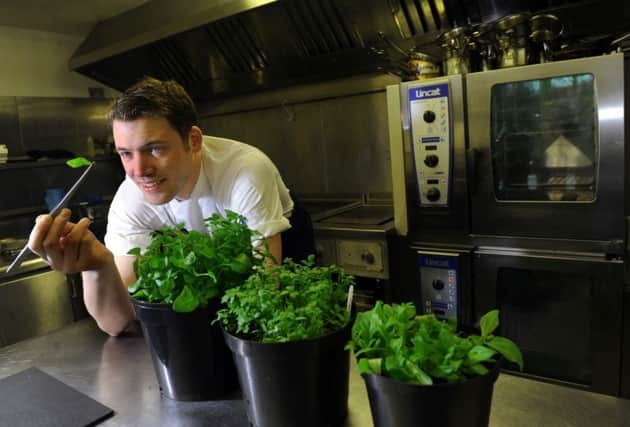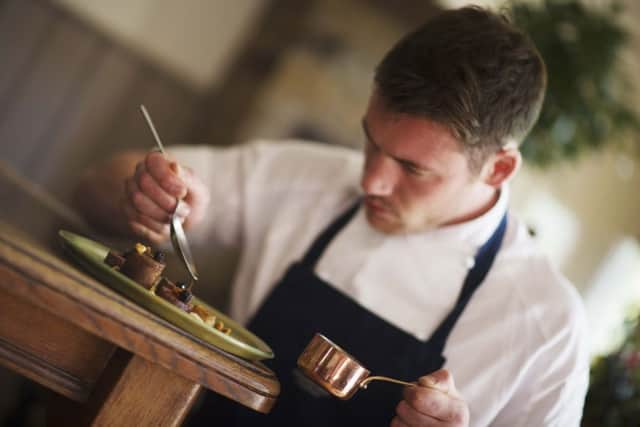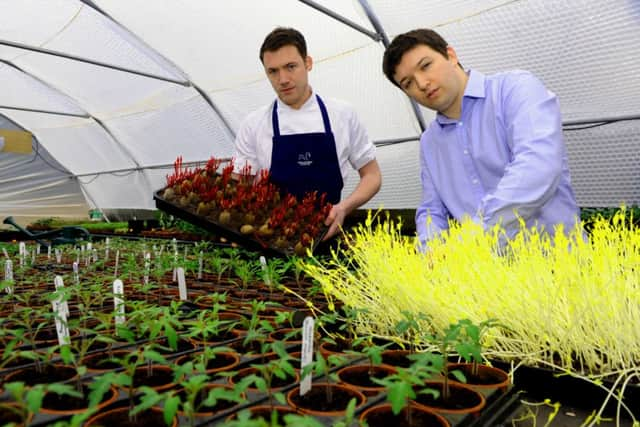So, how DO you run a Michelin star restaurant?


“Yep, that’s Dad’s latest invention,” says head chef Tommy Banks, who runs the Michelin-starred restaurant along with brother James. “He turned up on it the other day, strapped on his backpack containing the fertiliser and off he went. He hasn’t patented it yet, but I reckon he’s onto something.”
Dad Tom and wife Anne own the 160- acre arable farm next door and when the old village pub came on the market in 2006 they decided to buy it. Partly it was about reinvigorating what had become a bit of a run down boozer in the North York Moors National Park, but it was also about giving their two sons a career in a part of the county where many struggle to find work.
Advertisement
Hide AdAdvertisement
Hide AdIt was a bit of a punt, but the Banks brothers have more than repaid their parents’ investment. It was back in 2012 that the Black Swan, close to the White Horse at Kilburn and Byland Abbey, first won its Michelin star under former head chef Adam Jackson. When he left, Tommy, who had been learning on the job, decided to take over in the kitchen, with James continuing to run the front of house.


“If I’m honest I’d never thought about becoming a chef before Mum and Dad bought the pub,” says Tommy. “Back then I was more into girls and sport. I certainly didn’t know what a Michelin star was, but we did know that we wanted to create something special here. Dad has always been the kind of person who thinks he can do anything and I guess James and I have both inherited a bit of that spirit.”
Having successfully held onto the prized Michelin star, which brings not just kudos, but bookings, the Banks brothers have proved they can deliver fine dining. Now they want to take the Black Swan to the next level, by making the restaurant – as far as is possible – self-sufficient.
“Obviously there’s a limit to what we can do – clearly we can’t get our fish from the back garden, but it’s something we’ve always been keen on, ever since we took over the pub,” says James. “When some establishments talk about local produce they mean it comes from the same county. When we talk about local produce, we tend to mean within a couple of miles. Over the last few years, we have built up really good relationships with farmers and growers in this part of the world, but now we are established it feels like the right time to step it up a notch.”
Advertisement
Hide AdAdvertisement
Hide AdThat means growing their own vegetables in a special polytunnel – built of course by Dad – and transforming the rest of a field into a terraced kitchen garden and orchard. It’s early days yet, but inside the oversized greenhouse, the next crop of tomatoes are doing nicely, as are the pots of oyster leaves and the very first strawberry shoots are just poking through.


“Our veg supplier is a man called Ken Holland, who is a bit of a legend to be honest,” says Tommy. “He runs a business up in the North East and after we kept asking him to grow different things he turned to us and said: ‘Lads, are you sure you don’t want to grow your own?’ It’s something we had been thinking about for a while and with Ken’s help we’ve now got the foundations in place and we are now just experimenting to see what works and what doesn’t.”
Opening one of the cupboards below the planting decks, Tommy reveals the brothers’ first attempts at clamping, an ancient farming technique to allow harvested root vegetables to be preserved throughout the winter by covering them in straw.
“This one didn’t quite work,” he says producing a rather limp looking carrot. “But the carrot tops taste pretty good. When you embark on something like this, it’s always going to be a pretty steep learning curve, but neither of us was keen on the idea of employing a gardener. Instead we decided that the chefs will be in charge of growing the fruit and vegetables that they then cook with. Often it’s the vegetables which are the star of the show – so we have a dish of ox cheek and cauliflower, but the cauliflower is actually done five different ways.”
Advertisement
Hide AdAdvertisement
Hide AdIt’s not just the way the restaurant sources its fruit and vegetables that the Banks brothers are keen to change. “The restaurant business is notorious for its long hours and very little time off. Typically, you come in at 8am, work until after midnight and in between spend all your time in a very hot kitchen,” says James. “We wanted to run our restaurant on a slightly different philosophy – it was one of the reasons why we decided not to do a lunch service. That was a difficult decision because you’re closing off an income stream, but it meant the chefs could work a 10 rather than 18 hour day and it gave us more time to explore the idea of self-sufficiency. Yes, Tommy and the rest of the kitchen spend a lot of time at the stove, but having the garden gives a different dimension to a day’s work.”
The menu at the Black Swan is also deliberately pared back. Each dish is referred to simply by its ingredients – duck, beetroot and chard or langoustine, Jerusalem artichoke and squid. French and Italian terms are banned as is any reference to the techniques used to create their award-winning dishes. Tommy also doesn’t go in for signature dishes, but if he has any trademark it’s perhaps the use of unusual ingredients – take the tasting menu desert of Douglas Fir, lemon and yoghurt.
“That came about when I was out walking in the woods just up the road. It was quite a damp day and the smell of the fir was just incredible. When I was looking for a new winter dessert I thought I just might be able to do something with it.”
The experimentation began and the result is a small piece of theatre.
Advertisement
Hide AdAdvertisement
Hide Ad“Give me a second,” says Tommy, scrolling through his phone for some footage of the dessert which is surrounded by dry ice and branches of the fir. “We’ve never had any restrictions on the menu, which means there is complete flexibility, so if I’ve been out and come across some wild garlic I can use that. I know that can be a little frustrating for James and the rest of the front-of-house team as suddenly there’s a new dish to talk to customers about, but it gives people a reason to come back as they know it will never be the same experience twice.
“When you become a head chef you have to find your own style and because I learnt on the job I’ve maybe had a lot more freedom than if I had gone down a more traditional route. I’ve lived here all my life, I’ve grown up in the landscape, so it was natural that it has had such an influence on the menu.”
The commitment to local produce in the kitchen is being mirrored front of house, with James working on a range of soft drinks, including homegrown elderflower cordial and lemonade.
“It would be tough if we lost the Michelin star, we are not on a main road, we are not a place people pass by, so official recognition is important to us. In the last 10 years Yorkshire has really come into its own when it comes to restaurants and having half a dozen Michelin star places is great as people often come up here to do mini tours.
Advertisement
Hide AdAdvertisement
Hide Ad“I know people who have lost their star and it’s frustrating because the nature of the guide means they don’t tell you why you have failed or why you have succeeded. That’s difficult, but it’s also the reason why Michelin is so prestigious. The lack of guidelines means you have to plough your own furrow, there are no rewards for ticking boxes.”
And with that, the Banks brothers are off back to the potting shed to prepare for another busy service.